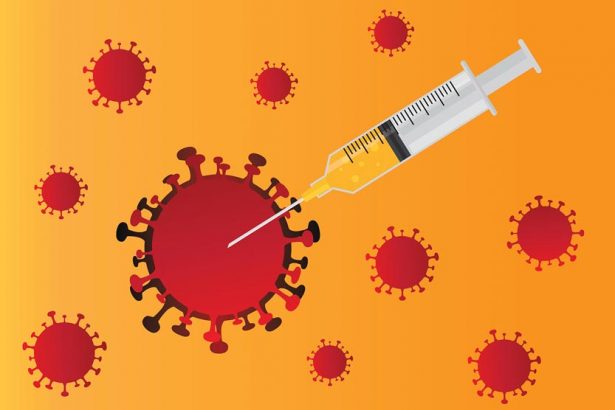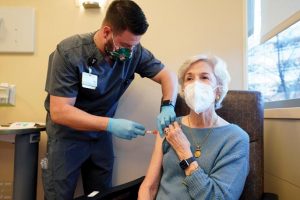Shot Shield
April 29, 2022

Illustration by Adobe Stock
Vanderbilt-Ingram Cancer Center (VICC) has taken multiple measures since the COVID pandemic began two years ago to protect its patients, study how the disease affects immunocompromised people and provide them with an extra shield against infection.
“The pandemic brought unique challenges and required quick changes in how we provided care,” said Laura Goff, MD, executive medical director for the VICC Cancer Patient Care Center. “We met those changes, switching from traditional office visits to telemedicine visits whenever possible and implementing additional infection control protocols in our clinics. Throughout the course of the pandemic, we’ve been at the forefront of advances. We were among the first cancer centers to offer our patients vaccinations when they became available. Our researchers have led worldwide efforts to monitor how COVID affects patients with cancer and how well the vaccines worked for them. We have also partnered with researchers outside the Cancer Center to ensure that our patients benefit from the latest treatment and prevention advances.”
One of the latest advancements is Evusheld, a new antibody combination to protect people at higher risk from serious illness from COVID-19.
On Dec. 22, 2021, Caroline Davis of Nashville became the first patient at Vanderbilt University Medical Center (VUMC) to receive injections of Evusheld. The antibodies were discovered by James Crowe, MD, the Ann Scott Carell Professor, Robert Carnahan, PhD, and their colleagues in the Vanderbilt Vaccine Center.
Six antibodies were licensed in June 2020 to the global biopharmaceutical company AstraZeneca for optimization and advancement into clinical trials. Eighteen months later, in December 2021, the company’s combination of two long-acting antibodies, called Evusheld, became the first monoclonal antibody treatment to receive emergency use approval for prevention, rather than treatment of COVID-19. Nearly 650,000 doses had been administered by early March 2022.
The therapy is authorized only for adults and children 12 years and older who are not currently infected with the COVID-19 virus and who are immunocompromised because of medical conditions or treatment for disorders including cancer or who have a history of a severe adverse reaction to a COVID-19 vaccine.
Davis, who is being treated for cancer at VUMC, said she could not produce antibodies against the COVID-19 virus on her own, despite receiving two doses of a COVID-19 vaccine and a booster, because the chemotherapy she is receiving suppresses her immune system.
“It’s very exciting,” she said, before Cody Stubblefield, RN, gave her two injections of the antibodies, one in each arm, in an outpatient clinic at VUMC. “This is the best Christmas present that could possibly have been given to me.”
Davis’ physician, David Morgan, MD, said, “In patients for whom the vaccine doesn’t work, this is a great option.” Morgan, associate professor of Medicine in the Division of Hematology and Oncology, estimated that hundreds of patients being treated for cancer at VUMC could benefit from Evusheld.
The injections provide about six months of protection from COVID-19 with only minor side effects such as rash, headache and mild fever. Preclinical data released by AstraZeneca suggest that Evusheld is protective against the omicron variant of COVID-19. One of the studies showed that the long-acting, two-antibody combination reduced the risk of COVID-19 symptoms at six months by 83% compared to inactive placebo.
Evusheld currently is the only antibody combination given by intramuscular injection to protect uninfected people from COVID-19. Other antibody combinations are given by intravenous infusion to patients who have recently been infected to prevent them from becoming seriously ill.
Because of the limited supply, Evusheld will be given only to the highest risk patients, including transplant recipients and those being treated for cancer. Patients who qualify should contact their physicians, who will order the injections and place them on a list to receive them as soon as possible.
Evusheld is not an option for people who are not immunocompromised or who have not had a severe adverse reaction to a COVID-19 vaccine. For most people, “vaccination is still the primary prevention,” Morgan said.
The VUMC research was supported by the Defense Advanced Research Projects Agency of the U.S. Department of Defense, the National Institute of Allergy and Infectious Diseases, part of the National Institutes of Health, and the Dolly Parton COVID-19 Research Fund at Vanderbilt.
The need for this extra shield of protection for patients with cancer was shown in a study published Dec. 24, 2021, in Annals of Oncology, one of a series of studies done by the COVID-19 and Cancer Consortium (CCC19). VICC was one of the founding members of the consortium, which has been tracing the impact of COVID-19 since the beginning of the pandemic. The study was the first to evaluate the clinical characteristics and outcomes of fully vaccinated patients with cancer who had breakthrough infections. Patients who experienced breakthrough infections had a hospitalization rate of 65%, an ICU or mechanical ventilation rate of 19% and a 13% death rate.
Patients were considered fully vaccinated after having received two doses of either the Pfizer or Moderna vaccine, or one dose of the Johnson & Johnson vaccine, with the last vaccine dose long enough before breakthrough COVID-19, to consider them as fully vaccinated. The data were collected between Nov. 1, 2020, and May 31, 2021, before booster vaccines were recommended for patients with cancer by the U.S. Centers for Disease Control and Prevention.
“Because measures of immunity are not routinely collected in clinical care, we don’t know whether these were patients who mounted effective immune responses after vaccination; a lot of emerging data have suggested that patients with cancer, especially blood cancers, don’t mount adequate protective antibody responses. It’s important to note that many of the same factors that we identified prior to the availability of vaccination — age, comorbidities, performance status, and progressing cancer — still seem to drive many of the bad outcomes,” said Jeremy Warner, MD, director of the CCC19 Research Coordinating Center, associate professor at VICC and a senior author of the study.
The consortium identified 1,787 patients with cancer and COVID-19 for the study, the vast majority of which were unvaccinated. The number of fully vaccinated was 54, and 46% of those fully vaccinated had reduced levels of lymphocytes — the T cells and B cells responsible for immunological responses to viruses. Lymphopenia commonly occurs in patients with cancer receiving anti-CD20 monoclonal antibodies or CAR-T-cell treatments for hematologic malignancies, including lymphoma and leukemia. The study appears to support previous observations that patients with hematologic malignancies are at greater risk for severe outcomes from COVID-19. However, the number of patients in the study is too small to make definitive conclusions about specific types of anti-cancer therapies that might be associated with breakthrough infections, the researchers noted. Patients on a treatment regimen of corticosteroids also appeared to be more susceptible to hospitalization.
A prior study by CCC19, published in June 2021, revealed that treatment with convalescent plasma vastly improved the survival rate of patients hospitalized for COVID-19 who also had hematologic malignances that compromise the immune system.

Cody Stubblefield, RN, gives the first of two injections of an antibody combination to Caroline Davis to protect her from COVID-19. Photo by Donn Jones.
Patients who received convalescent plasma from donors who had recovered from COVID-19 had a death rate of 13.3% compared to 24.8% for those who did not receive it. The difference was more striking with patients admitted to intensive care units, where patients treated with convalescent plasma had a death rate of 15.8% compared to 46.9% for those who weren’t.
“Despite the inevitable limitations of retrospective data, gathering enough case reports was really only possible through a large and comprehensive registry such as ours. We find these results compelling and certainly hope that they will be quickly investigated in a prospective clinical trial,” Warner said.
The study compared the 30-day mortality of hospitalized adults with both a hematologic malignancy and a COVID-19 diagnosis from 71 medical centers that participate in the international CCC19 consortium. The analysis was conducted on 143 patients who received convalescent plasma and 823 who did not.
Hematologic malignancies, such as chronic lymphocytic leukemia and multiple myeloma, are associated with defects in immunity, which can be exacerbated with treatments for the cancers, putting patients with these blood cancers at additional risk for infections and infectious disease severity. Prior small case reports had noted improvements when these patients have been administered convalescent plasma as a treatment for COVID-19, but this study is the first retrospective cohort study to indicate a benefit when compared to nonrecipients.
“It is scientifically very satisfying to demonstrate that the idea of using sera from the convalescent patients that was probably first used during the 1916 New York outbreak of poliomyelitis, and then also during the 1918 Spanish influenza, is so useful in saving lives during COVID-19, the first great pandemic of this century,” said Sanjay Mishra, PhD, MS, a staff scientist at VUMC, project manager of CCC19 and a co-author of the study.
